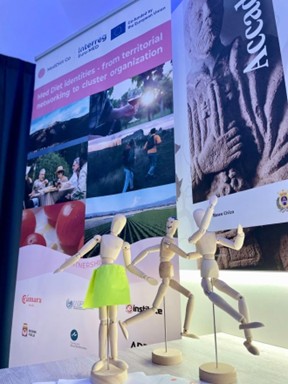A grandmother’s “pancotto.” The smell of sun-dried tomatoes. A childhood summer in Vieste. These were just some of the stories painted onto dinner plates at the historic Palazzo Dogana in Foggia, where on May 22, 2025, the first INNESCARE Living Lab came to life. More than just an event, it marked the start of a Mediterranean journey—where food becomes memory, identity becomes experience, and tradition becomes innovation.
Organised by the Puglia Region’s Department of Tourism, Economy of Culture and Valorization of Territory, the event was held within the framework of Interreg “MedDiet Go!”. The Living Labs are designed as creative spaces for communities to co-design services and strategies that place the Mediterranean Diet at the heart of sustainable tourism and regional development.
“The goal is to create tourism models that go beyond seasonality and reflect the real soul of the territory,” said Anna Introna, who opened the session with Michele Cera, both representing the Apulia Region.
Led by Andrea Gelao, an expert in participatory design, the participants (including citizens, cultural actors, and local stakeholders) were invited to reconnect with personal and shared memories tied to Mediterranean food traditions.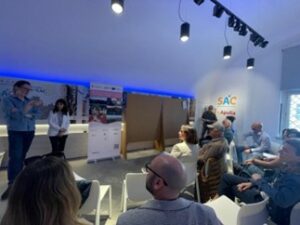
They wrote those memories on dinner plates: some recalled the family kitchen, others the scent of wild herbs or traditional dishes made with love and leftovers. These plates were then displayed on a wall, a mosaic of stories, emotions, and belonging. From this emotional ground, the group co-created a “Treasure Map” of the Mediterranean Diet in the Foggia area. They identified meaningful places (like the Monti Dauni, the Foresta Umbra, and Lake Varano), key actors (from farmers and chefs to cultural associations and schools), and recurring practices such as the olive harvest, homemade tomato sauce, or religious feasts.
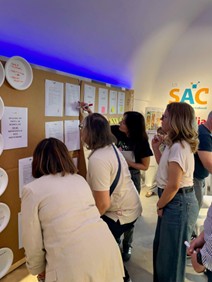
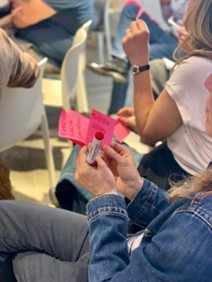
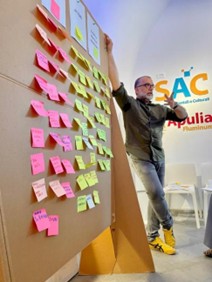
“This isn’t just a symbolic gesture,” noted Andrea Gelao. “It’s the foundation of a Mediterranean Diet Hub—a space that will connect knowledge, experiences, and services across regions.”
The Living Lab also introduced 10 fictional but research-based “personas”—representing diverse community profiles like the Young Activist, Territory Chef, and Narrating Sommelier. These personas helped frame local needs, challenges, and aspirations in human terms. Two figures sparked particular resonance: the Custodian of Taste and Knowledge, a 45-year-old passionate about educating youth on culinary heritage, and the Experience Builder, a travel designer eager to replace stereotypes with authentic stories.
Working in small groups, participants explored how future services could respond to these personas, designing ideas that blend identity, sustainability, and community needs. Each team presented their work using hand-painted wooden mannequins representing their character, bringing the stories to life in a striking visual finale.
“This co-creation process is about designing from the inside out,” said Gelao. “We start with people —their values, their stories— and build a network of Mediterranean innovation from there.
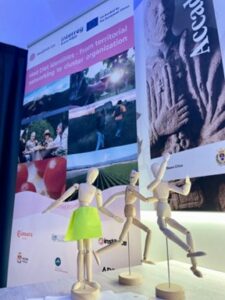 As the first in a series of INNESCARE Living Labs across partner territories, the Foggia event laid a meaningful foundation. It confirmed that the Mediterranean Diet is far more than a set of culinary practices—it’s a way of living, a shared memory, and a vision for the future. And this journey is only beginning.
As the first in a series of INNESCARE Living Labs across partner territories, the Foggia event laid a meaningful foundation. It confirmed that the Mediterranean Diet is far more than a set of culinary practices—it’s a way of living, a shared memory, and a vision for the future. And this journey is only beginning.
The next Living Lab session will return to Foggia on June 17, 2025, from 3:00 PM to 6:00 PM, and will shift from reflection to creation. Participants will engage in a collaborative design sprint focused on developing and prototyping concrete service ideas for the future Mediterranean Diet Hub—directly responding to the needs and aspirations of the community “personas” identified in the first session.
By transforming local stories into shared solutions, MedDiet Go! continues to shape a more connected, sustainable, and culturally rich Mediterranean space—together, from the ground up.

